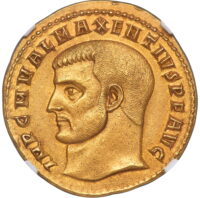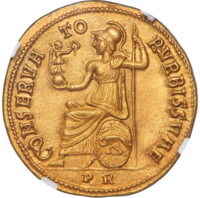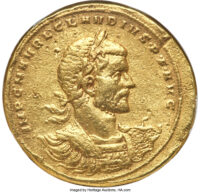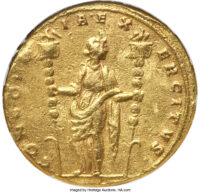The gold quaternio struck by the emperor Maxentius around 308 A.D. to celebrate himself for rebuilding the Temple of Venus and Roma in Rome sold at auction on November 2nd for $312,000, well above its pre-sale estimate of $100,000 – $200,000.
Another Roman gold medallion minted for a less virtue-signaling purpose also sold at the same coin auction. It is an eight aurei medallion, so a single gold coin weighing eight times the amount of a circulation aureus, but it sold for $63,000, a fifth of the price of the quaternio. It was minted in Milan in 268 A.D. by a brand-new emperor, Claudius II. His predecessor Gallienus had been assassinated by one of his officers while besieging Milan to quash yet another attempted usurpation. The troops then acclaimed Claudius emperor.
There were rumors that Claudius was in on the assassination, but if so, he was unusually kind to the allies and family of the man he killed to snatch his throne. He spared Gallenius’ supporters from reprisals and focused instead on fighting the Gothic invasion of Rome’s Balkan provinces. To accomplish his military goals, Claudius had to ensure the loyalty of the army. The best way to accomplish that, established by centuries of tradition at this pont, was to buy it. The price to buy off the officers was 10 gold aurei each, an enormous sum. The highest-ranking and most influential officers received their bribes in the form of these gigantic gold medallions.
The eight-aurei medallion of Claudius II features the laureate cuirassed bust of the emperor on the obverse and the goddess Concordia holding the standards of the legions on the reverse. The inscription on the reverse reads CORCORDIA EXERCITVS, ie, “harmony in the army,” because that was exactly what he was buying. Claudius was famous for his strength as a wrestler and in hand-to-hand combat. He once reputedly punched a horse in the face and knocked out its teeth. He was a direct man, to put it mildly, and called them as he saw them even on his giant bribe coins.
It worked, though. In 270, Claudius led the army to a massive victory over the Goths at the Battle of Naissus in modern-day Serbia. He was granted a triumph and the cognomen Gothicus. He didn’t get to enjoy either, but not because of treachery among the officer staff. Plague took his life before the bloom was off the rose. He was immediately deified and heavily mourned in spite of (or perhaps because of) his all-too-brief reign.



